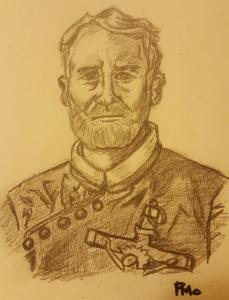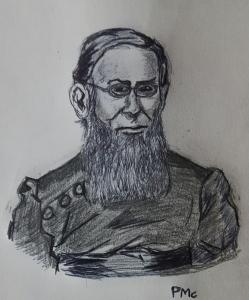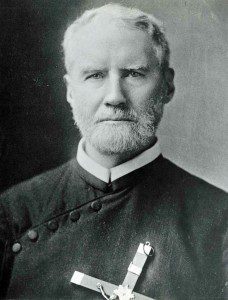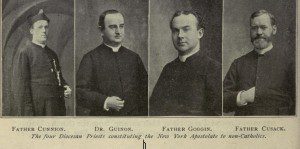 The parish mission, which traces it roots to 1500’s Europe, was the Catholic counterpart to the Protestant revival meeting. It comprised a series of week-long lectures, with Masses and Confessions, designed to “jump-start” the life of the local faith community. In nineteenth century America, the Paulist Fathers offered missions to non-Catholics, at the very time when anti-Catholic sentiment was at an all time high, presenting Catholicism in a positive manner. Paulist Father Walter Elliott (1842-1928), an experienced mission preacher, offers suggestions to mission preachers on reaching the non-Catholic listener.
The parish mission, which traces it roots to 1500’s Europe, was the Catholic counterpart to the Protestant revival meeting. It comprised a series of week-long lectures, with Masses and Confessions, designed to “jump-start” the life of the local faith community. In nineteenth century America, the Paulist Fathers offered missions to non-Catholics, at the very time when anti-Catholic sentiment was at an all time high, presenting Catholicism in a positive manner. Paulist Father Walter Elliott (1842-1928), an experienced mission preacher, offers suggestions to mission preachers on reaching the non-Catholic listener.
Description of a Mission to Non-Catholics
- A series of public lectures addressed to non-Catholics. Usually continued daily for a week or more. Sometimes on Sunday night for a certain time.
- Answering questions received in the Question Box.
- Forming an inquiry class for closer intercourse.
- A class of converts for making a beginning of their instruction.
- The distribution of missionary literature.
- Daily private interviews with individual non-Catholics.
- Publication of lectures and questions in the local press.
- Using means and expedients for obtaining the attendance of non-Catholic
The lectures should be a minimum of 4,500 words– three-quarters of an hour long, as follows: The introductory sermon is on Zeal for Souls, preached on the opening Sunday, addressed to Catholics, arousing zeal for convert-making, showing how to co-operate in the mission.
- The Necessity of Revelation– Can We Get Along Without the Bible?
- The Divinity of Christ– Is Christ Truly God as Well as Man?
- The Necessity of Faith– Is One Religion as Good as Another?
- Religious Indifferentism.
- How Much Christian Doctrine Must One Believe in Order to be Saved?\
Any one of these may be preached the first night:
- The Rule of Faith– The Catholic Church and the Bible.
- The Protestant Rule of Faith– The Bible Alone, Privately Interpreted.
- The Confessional– The Divine Obligation to Confess Sin.
- How Sins are Forgiven.
- Is Confession of Sin Necessary for God’s Pardon?
- The Real Presence of Jesus Christ in the Communion Service.
- Is Christ actually present in the Catholic Communion?
- The Sacrifice of the Mass– The Catholic Celebration of the Lord’s Supper.
- Prayers for the Dead– Can we Lawfully Pray for Our Departed Friends?
- The Intercession of the Saints and Angels in Heaven.
- The Blessed Virgin Mary, Her Place in God’s Plan of Saving Mankind.
- The Authority of the Bishop of Rome.
- The Marks of the True Christian Church.
- Why I am a Catholic.
- Christian Matrimony.
- Secret Societies.
- Christian Education.
- How the Catholic Church Deals with Sinners.
- Eternal Rewards and Punishments.
- Internal and External Religion.
- Fidelity to Grace– The Sower and the Seed.
- The Personal God– does He Exist?
- The Overruling Providence of God.
- The Voice of Conscience– Or the Divine Guide in the Human Soul.
- Freedom of the Will.
- The Immortality of the Soul
Remember that most of our non-Catholic people had rather have God without any Church: they are suspicious of organized religion. Our Church, then, is to them a maze of observances and ceremonies and formalities, with little interior spirit. Show the inner reality. Our organism is to them solely a system and a hierarchy. Show the reality by constantly developing the interior counterpart. Avoid the spirit and the matter and the weapons of controversy.
Fervently pray to God to place your mind in the attitude of a sincere Protestant of the most bigoted kind, born and bred with aversion to Catholicity. And then cultivate a real sympathy for his difficulties. Christian faith and hope and love and repentance and holiness is the one aim of Catholicity. In the lecture on the Real Presence, show the intimate union with God– on Confession, show the inner sorrow and shame, and the sweet sense of pardon– on the Rule of Faith, show the deep peace of mind and the solid certitude about God’s truth.
Now most if all Protestants fancy that the Church stands athwart the way leading to God. Show that she always leads them to God and is indispensable for union with God. The missionary should be fit to exhibit in his own character the highest results of the Church’s influence.
No topic is so interesting to non-Catholics as the missionary himself. Is he sharp? Learned? Humorous? Eloquent? Or rather this: kindly? Patient? Sincere? Let them say this: You feel at home with him. If I ever should believe in Confession, I would choose him. And let them add: beside these qualities he is thoroughly competent in Holy Scripture, history, reason; and he knows Protestants well.
Walter Elliott, C.S.P., A Manual of Missions (Washington, D.C.: The Apostolic Mission House, 1922), 162-170.
(*The above drawing of Father Elliott is by Pat McNamara.)











